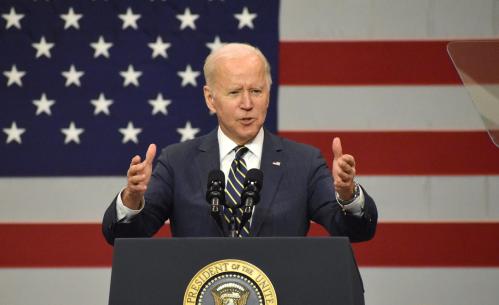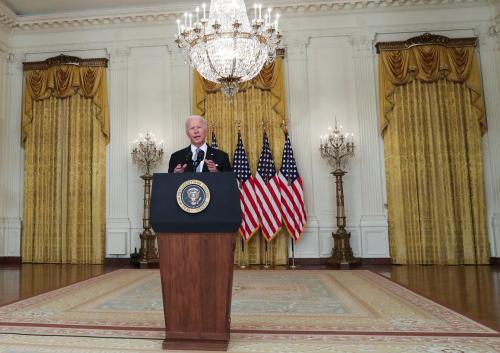In her recent State of the State address, New York Governor Kathy Hochul became the latest in a long line of politicians to call for term limits of elected officials. That banging sound you may have heard immediately following the speech is the heads of political scientists and government reformers across the country reacting to her plea.
Why the frustration? Term limits—despite their broad appeal to a politically dejected public—simply don’t provide the benefits advocates promise. In fact, as study after study, expert after expert, has warned, the implementation of term limits in numerous state legislatures has only exacerbated many of the problems their adoption aimed to solve.
States with term limits haven’t led to a more diverse, representative cadre of lawmakers; they haven’t incentivized legislators to spend more time seeking bipartisan policies or more efficient responses to constituent’s requests; they haven’t borne politicians less dependent on lobbyists or special interests; nor have they produced members who are more in-tune with their constituents’ policy wishes or more willing to give up politics once their time in office is up.
Instead, term limits have been found to empower actors outside the chambers, including lobbyists, agency bureaucrats, and long-serving staffers. They have done little to minimize the time spent on fundraising or other electoral activities or slow the revolving door between the private and public sectors. And they have been found to cause what scholars call a ‘Burkean shift,’ where members care less about the interests of their constituents and more about their own personally held beliefs; when they know their electoral fates aren’t dependent on the voters any longer they defer more to their personal stances.
But, to be fair, most of the analysis on term limit effects focus on state legislators. Hochul’s term limit proposal is different; she wants to propose an amendment to the New York state constitution that would limit state-wide officers—governor, lieutenant governor, attorney general, and comptroller—to two terms in office. The state’s Assembly and Senate, as well as voters via a referendum, would all need to agree to the measure in order to be added to the state’s constitution.
Term limiting officials with unilateral powers, particularly governors, is much different than placing tenure limits on members of an assembly. Without broad agreement, single members struggle to do much in a legislature. They are, by design, collective bodies. State-wide offices, on the other hand, generally provide much more concentrated powers to their occupants. The individuals in these positions can make autonomous decisions with far-reaching effects without the requirement of a majority. An AG’s choice to prosecute a case, for example, isn’t dependent on building a coalition the way a state lawmaker must for a bill. And a governor and his or her lieutenant are the heads of their respective state agencies, boss to thousands, and face little bureaucratic opposition to their directives.
As a consequence, the power of certain offices can be as impactful as it can be intoxicating. This is why George Washington felt it important to establish the two-term tradition for presidents in 1796 despite the Framers’ explicit rejection of term-limits for presidents (and members of Congress for that matter). It’s why the 22nd Amendment was ratified in 1951 following FDR’s four consecutive elections. And it’s also why 36 states have adopted some form of gubernatorial term limits.
Term limits guarantee no single individual can concentrate those authorities to indefinitely retain their position. For state and federal legislators, this is less of a concern. While some lawmakers have an effective chokehold on their seats, none has the comparable unilateral authority of a governor. Term limiting all members of the legislative branch, then, is viewed by most experts as a draconian, ill-advised measure that will severely hamper the legislature’s capacity.
So then, where does that leave us with Hochul’s proposal to limit statewide officers to two terms? Is it a necessary step, as the Governor says, to ensure that “those in power cannot continue to cling to it”? Or will their adoption simultaneously take power away from voters to choose their own leaders and turn term-limited officials into lame ducks their last term in office? Perhaps a bit of both.
The research on the effects of term limiting elected officials other than state legislators is sparse, but as with studies of legislator term limits, there are some findings that suggest tenure limits of executive officers produces some negative outcomes unanticipated by well-meaning proponents. One early study found states that term-limited their governors had higher government spending and tax rates than those without because, the authors argue, the term-limited governors didn’t fear the electoral backlash of the increased spending and increasing taxes to pay for it. Similarly, a 2011 study found states with reelection-eligible incumbents produced more economic growth and lower taxes, spending, and borrowing costs.
Outside the U.S., research shows that local elected officials eligible for reelection engage in less corruption than those who are term limited. And a panel study of 48 democratic countries over nearly two decades found that the size of government expanded more rapidly in countries with one-term limits than those who limit officials to two terms. The common thread in each of these studies is the impact of the electoral connection; when officials need voters to keep them in power, they work to keep them happy; when they don’t, shirking can follow.
Perhaps Hochul’s proposal will result in the perfect balance of responsiveness and time-limited authority within New York’s statewide elected offices. After all, the vast majority of other U.S. states have decided the potential downsides of term-limiting certain officials aren’t enough to outweigh the positives gained by their implementation.
The sentiment of the governor’s proposal is pure, especially for the many citizens who assume that the primary goal of any elected official is to maintain their office at all costs. But, don’t forget that the very politicians who clamor for term limits–including Governor Hochul–can always voluntarily subject themselves to the very limits they want imposed on everyone else.
The Brookings Institution is committed to quality, independence, and impact.
We are supported by a diverse array of funders. In line with our values and policies, each Brookings publication represents the sole views of its author(s).






Commentary
New York term limits could have unintended consequences
February 3, 2022